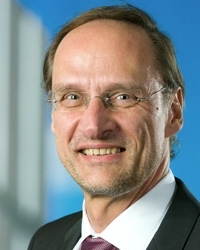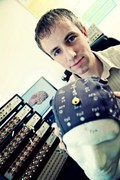Keynote Speakers
Keynote speaker slides
Professor Thomas Bäck
Head of Natural Computing Group
Leiden Institute of Advanced Computer Science (LIACS)
Leiden University
The Netherlands
Web link
Google Scholar link
Automatic Configuration and Learning for Evolutionary Computation
Thomas Bäck, Leiden Institute of Advanced Computer Science (LIACS), Leiden University, Netherlands
Much research in evolutionary computation focuses on the design and application of new algorithm variants for obtaining better results for hard application problems. For evolution strategies, a class of evolutionary algorithms, I will briefly discuss a few variants and their performance, and then illustrate a typical application example from the domain of industrial engineering design (such as ships, cars, etc.).
I will argue, however, that the traditional, expert-driven algorithm development approach has its limitations, and that there are suitable approaches towards an automatic configuration of evolutionary algorithms in general, and evolution strategies in particular. This is motivated by some early work on the (hyper-parameter) optimization of genetic algorithms. Recent research in my group resulted in the configurable CMA-evolution strategy, which makes 4.608 variants of evolution strategies possible – most of which have never been tried before. This generalization can not only be used for searching through configuration space, but the optimization results can also be analyzed using data-driven approaches, resulting in a better understanding of the search mechanism.
From my perspective, this is only the beginning, since the results clearly indicate that the algorithm configuration should also be able to switch during the optimization run, and that the switching strategy could add an additional benefit for the algorithm’s convergence runtime. Ultimately, it would be great if the algorithm could continuously learn the changing requirements for module activations, which requires internal machine learning mechanisms such as multi-armed bandit or reinforcement learning approaches. For these topics, I will present first results and outline the potential for further research.
The talk concludes by providing a short overview of research topics and industrial projects in my research group.
Bio
Thomas Bäck is professor of Computer Science at the Leiden Institute of Advanced Computer Science, Leiden University, Netherlands, since 2002.
He received his PhD in Computer Science from Dortmund University, Germany, in 1994, and was leader of the Center for Applied Systems Analysis at the Informatik Centrum Dortmund until 2000.
Until 2007, Thomas was also CTO of NuTech Solutions, Inc. (Charlotte, NC), where he gained ample experience in solving real-world problems in optimization and data analytics, by working with global enterprises in the automotive and other industry sectors.
Thomas received the IEEE Computational Intelligence Society (CIS) Evolutionary Computation Pioneer Award for his contributions in synthesizing evolutionary computation (2015), was elected as a fellow of the International Society of Genetic and Evolutionary Computation (ISGEC) for fundamental contributions to the field (2003), and received the best dissertation award from the "Gesellschaft für Informatik" in 1995.
Thomas has more than 300 publications, as well as two books on evolutionary algorithms: Evolutionary Algorithms in Theory and Practice (1996), Contemporary Evolution Strategies (2013). He is co-editor of the Handbook of Evolutionary Computation and the Handbook of Natural Computing. Thomas is also Co-Editor-in-Chief of the Natural Computing Series (Springer) and the journal Theoretical Computer Science C (Elsevier), and editorial board member of various journals.
Thomas’ research interests are in foundations and applications of evolutionary computation, efficient global optimization, and multiple objective optimization. His recent research also addresses optimization methods in machine learning, e.g., for hyperparameter optimization, as well as supervised and unsupervised machine learning for smart industry applications.
Professor Damien Coyle
Director of Intelligent Systems Research Centre
School of Computing, Engineering and Intelligent Systems
University of Ulster
UK
Web link
Google Scholar link
Professor Damien Coyle, Professor of Neurotechnology and Research Director, Intelligent Systems Research Centre, Ulster University
Decoding mental imagery from electroencephalography (EEG) with Brain-Computer Interface Technology
Research in the field of brain–computer interfaces (BCIs) and neurotechnology has proven that electrical signals in the brain, modulated intentionally by mental imagery, can relay information directly to a computer, where it is translated by intelligent algorithms (some inspired by the brain’s neural networks) into control signals that enable communication and control without movement. This talk will show that people with restricted abilities resulting from disease or injury may benefit from this technology, for example, those who have prolonged disorders of consciousness or locked-in syndrome following traumatic brain injury.
Neural activity can be modulated by many kinds of mental imagery e.g., classical motor imagery BCIs distinguish between imagined hand/arm movements. This presentation will show recent results in decoding imagined three-dimensional limb movements, imagined primitive shapes, emotion inducing imagery and silent speech from EEG. The presentation will attempt to address the question is it feasible to expect high and robust performance with these types of imagery in EEG-based BCIs and will highlight results which indicate user proficiency in BCI control is a matter of training time, machine learning/AI ability, and application of the technology.
Training over multiple sessions is certainly key to learning how to modulate brain activity via a motor imagery and this involves the collection of large dataset from multiple users. An AI-enabled wearable neurotechnology and cloud technologies platform that can enable this and is capable of streaming, storing, visualising and analysing big brain data in real-time from multiple parallel users from any location will also be described in this talk.
Bio
Damien Coyle, Professor of Neurotechnology, is currently Director of the Intelligent Systems Research Centre and Research Director in the School of Computing, Engineering and Intelligent Systems at Ulster University. He has published research papers in areas such as computational intelligence/AI, bio-signal processing, computational neuroscience, neuroimaging, neurotechnology and brain-computer interface (BCI) applications and has won a number of prestigious international awards for his research including the IEEE Computational Intelligence Society (CIS) Outstanding Doctoral Dissertation Award and the International Neural Network Society (INNS) Young Investigator of the Year Award. Professor Coyle is also CEO of NeuroCONCISE Ltd, the Ulster University spinout company he founded in 2016 to build wearable, AI-enabled neurotechnology that non-invasively measures and translates brainwaves into control signals to enable people to interact with technology and communicate without moving. In 2018 NeuroCONCISE Ltd was winner of the IET and E&T Innovation of the Year Award.


